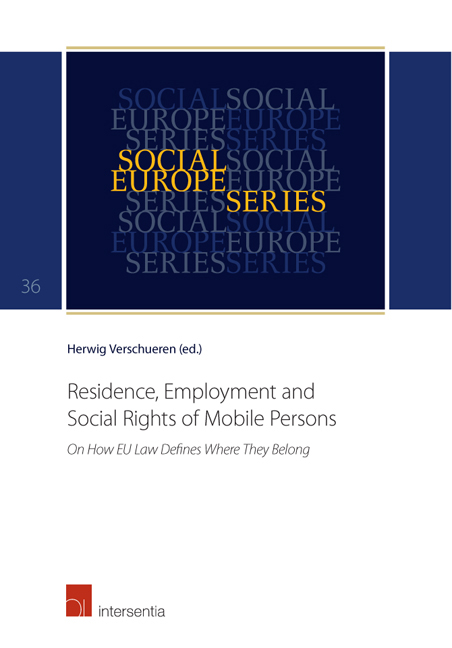Book contents
- Frontmatter
- Preface
- Contents
- List of Abbreviations
- List of Contributors
- Chapter 1 How EU Law Defines where Mobile Persons Belong. An Introduction
- Chapter 2 Family as Link. Explaining the Judicial Change of Direction on Residence Rights of Family Members from Third States
- Chapter 3 The Direction of the Court's Family Reunification Case-Law. A Plea for (Timely) Moderation
- Chapter 4 Sufficient Resources and Residence Rights under Directive 2004/38
- Chapter 5 Free Movement of Persons and European Solidarity. A Melancholic Eulogy
- Chapter 6 Once a Foreigner, Always a Foreigner. Who Does Not Belong Here Anymore? Expulsion Measures
- Chapter 7 Who Does Not Belong Here Anymore? A Statistical Snapshot of Member States’ Practices
- Chapter 8 Civic Integration Exams in EU Immigration Law. What Integration is Not in European Law
- Chapter 9 I Study Here, and Thus I Belong? Mobile Students in the European Union
- Chapter 10 Being Economically Active: How It Still Matters
- Chapter 11 Where Do EU Mobile Workers Belong, According to Rome I and the (E)PWD?
- Chapter 12 Conflicting Rules of Conflict: Social Security and Labour Law
- Chapter 13 Conflicting Rules of Conflict: Social Security and Labour Law. A Response
- Chapter 14 Where Does the UK Belong?
Chapter 7 - Who Does Not Belong Here Anymore? A Statistical Snapshot of Member States’ Practices
Published online by Cambridge University Press: 22 September 2018
- Frontmatter
- Preface
- Contents
- List of Abbreviations
- List of Contributors
- Chapter 1 How EU Law Defines where Mobile Persons Belong. An Introduction
- Chapter 2 Family as Link. Explaining the Judicial Change of Direction on Residence Rights of Family Members from Third States
- Chapter 3 The Direction of the Court's Family Reunification Case-Law. A Plea for (Timely) Moderation
- Chapter 4 Sufficient Resources and Residence Rights under Directive 2004/38
- Chapter 5 Free Movement of Persons and European Solidarity. A Melancholic Eulogy
- Chapter 6 Once a Foreigner, Always a Foreigner. Who Does Not Belong Here Anymore? Expulsion Measures
- Chapter 7 Who Does Not Belong Here Anymore? A Statistical Snapshot of Member States’ Practices
- Chapter 8 Civic Integration Exams in EU Immigration Law. What Integration is Not in European Law
- Chapter 9 I Study Here, and Thus I Belong? Mobile Students in the European Union
- Chapter 10 Being Economically Active: How It Still Matters
- Chapter 11 Where Do EU Mobile Workers Belong, According to Rome I and the (E)PWD?
- Chapter 12 Conflicting Rules of Conflict: Social Security and Labour Law
- Chapter 13 Conflicting Rules of Conflict: Social Security and Labour Law. A Response
- Chapter 14 Where Does the UK Belong?
Summary
In the ten years since the entry into force of Directive 2004/38, there has been a noticeable increase in the number of references for preliminary rulings made by the national courts to the EU Court of Justice concerning the expulsion of EU citizens and their family members. As Eleanor Spaventa rightly points out in her contribution, the codification by Directive 2004/38 of the Court's case-law under previous instruments and EU enlargement in 2004 and 2007 have certainly contributed to this rise in preliminary references. A further contributing factor appears to be the increasing propensity of Member States to have recourse to measures that restrict the free movement rights of EU citizens and their family members for reasons that do not necessarily relate to public order or public security. The purpose of this chapter is to provide a brief empirical review of the practices of the Member States in restricting the free movement rights of EU citizens and their family members, based upon official statistical data that have been made available by the Member States.
AVAILABILITY OF DATA ON EU RESIDENCE RIGHTS
Unlike the situation of third-country nationals covered by the EU's common visa and migration policies, Member States are not required to publish detailed statistical information regarding the application of Directive 2004/38. At present, Member States are only required to furnish data on the overall number of EU migrants having their usual residence in their territory, annual migration flows into and out of their territory, as well as the number of EU citizens who have acquired the nationality of the host Member State. It is therefore up to each Member State to determine what – if any – data to collate on the application of Directive 2004/38. They also determine whether to make such data available to the public in accordance with the legal framework governing access to such information.
Nonetheless, Member States do not have an absolute discretion in this regard. The Court of Justice has had an opportunity to examine the limitations that EU law places on the collection of information by Member States in connection with EU citizens who reside on their territory.
- Type
- Chapter
- Information
- Residence, Employment and Social Rights of Mobile PersonsOn How EU Law Defines Where They Belong, pp. 111 - 128Publisher: IntersentiaPrint publication year: 2016



